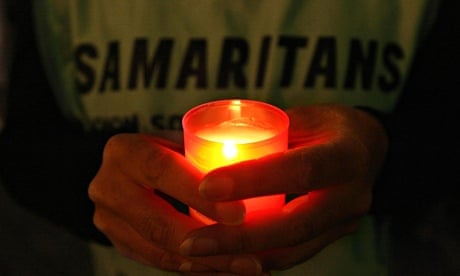The male suicide rate in the UK was 3½ times that of women in 2012, the highest ratio between the sexes in more than 30 years, official figures show .
The data was published as the University of Bristol and the Samaritans announced the launch of a project to investigate the impact of the internet on those with suicidal thoughts amid growing concerns about its effect on vulnerable people.
There were 4,590 male suicides registered in 2012, compared with 1,391 female, equating to 18.2 per 100,000 men and 5.2 per 100,000 women, according to the Office for National Statistics (ONS).
When the data series began, in 1981, the male suicide rate was 1.9 times that for women. But the rate for women halved, with a much smaller decrease (from 19.8 in 1981) for men.
Clare Wyllie, head of policy and research at Samaritans, said the figures showed that the highest suicide rate was among men aged 40 to 44, at 25.9 deaths per 100,000. This bore out the charity's own studies, which have found middle-aged men of low socioeconomic status to be most at risk. "They will grow up expecting by the time they reach mid-life they'll have a wife who will look after them and a job for life in a male industry," she said. "In reality they may find that they reach middle age in a very different position. Society has this masculine ideal that people are expecting to live up to. Lots of that has to do with being a breadwinner. When men don't live up to that it can be quite devastating for them."
Additional factors were the perception that it was more acceptable for men to turn to drink or other risky behaviour to cope with difficulty, and men being often reticent about talking about their feelings.
Paul Bristow, from the Mental Health Foundation, said: "We urgently need to know more about why being male is itself a risk factor in suicide and to do more to help men, especially young men, seek assistance rather than suffer in silence."
The study conducted by the University of Bristol and the Samaritans has funding from the Department of Health policy research programme.
It follows high-profile cases of young people who have taken their own lives after visiting self-harm sites, including Tallulah Wilson, 15, who died after being hit by a train in October 2012. At an inquest last month, her mother, Sarah Wilson, said Tallulah had been "in the clutches of a toxic digital world".
In a statement to the inquest, Wilson said that there was a need for a greater understanding of the impact of the internet on young people. She had been shocked by the ease with which children could access self-harm and suicide blogs. "Tallulah entered a world where the lines between fantasy and reality became blurred," she said. "It is every parent's worst nightmare. I appeal to big brands to withdraw their advertising from those sites who continue to host inappropriate self-harming and suicide-promoting blogs to stop this poison spreading."
But Wyllie said the research would also look at whether the internet could be a positive force.
She said: "There's a lot of material on the internet and from what we know about suicide the material carries risk with someone who's suicidal, but we also know lots of people go online for support."
There were 64 fewer suicides in 2012 than in 2011 and a slight reduction in the overall suicide rate per 100,000, from 11.8 to 11.6, despite a marginal increase in the male rate from 18.1 over the same period. But in 2011 there was a significant increase in both the number of suicides and the suicide rate from 2010.
Wyllie said that since 2007 the overall rate had risen, "tracking the economic climate". She said: "While we are pleased there hasn't been an increase [from 2011], we must not be complacent."
The Samaritans' 24-hour helpline is 08457 909090.
